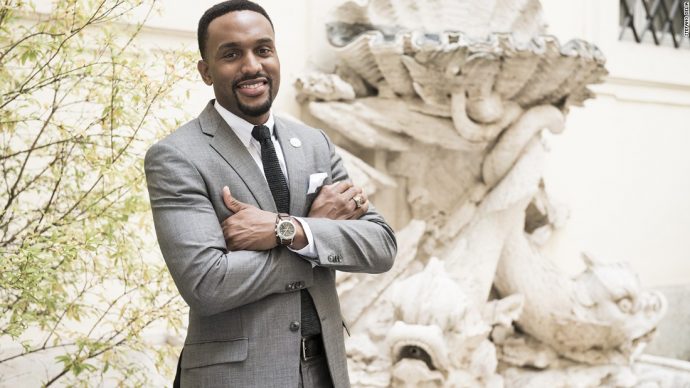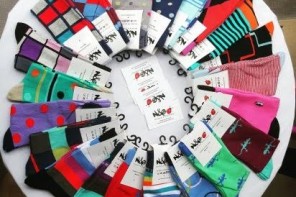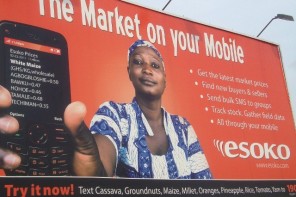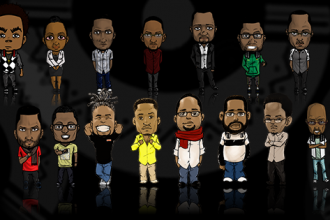As I arrived at ‘Nok by Alara’ (a trendy restaurant in Victoria Island) I was surprised at how comfortable Obinna looked blending in with his surroundings and harmonizing with the ambience of the restaurant. From the abrupt snap at the waiter to get me a menu, it was obvious that he had settled in and adopted the typical essence of Nigerians despite his years of being abroad.
Our conversation began with a light hearted exchange regarding our experiences as nationals born and raised outside of Nigeria. Obinna’s recollection featured his privileged upbringing full of opportunity in Washington DC; a stark difference to those of his peers from his hometown in Enugu (South East Nigeria). He recalled a time which many of us are familiar with, whereby his parents sent him back to Enugu at 13 years old to be immersed in Nigerian culture; not because he was naughty, but to ensure that he would not grow up ignorant of his roots…Ladies and gentlemen I introduce you to Obinna Ukwuani , Founder and CEO of: Exposure Robotics Academy, NESA by makers and Bruk Oil Mills.
A 2013 graduate from MIT, Obinna is an intelligent, multitalented man who is passionate about making an impact in Africa. From roles such as captain of his soccer team to valedictorian and teacher of robotics, he is clearly capable and no stranger to high academic achievement. Before his admission to MIT, Obinna was sought for by 22 universities some which include Columbia, Stanford and Cornell; therefore, you can imagine why I was particularly interested to know what inspired him to move back to Nigeria in 2015.
The topic of opportunity became a key theme during our conversation and it was even clearer when Obinna was unwillingly sent to boarding school in his hometown Enugu for 2 years at age 13. His movement back was a huge change for him and even though it was tough, it gave him insight and helped him fall in love with Nigeria in a raw way. Surrounded by family and peers, Enugu taught Obinna what it meant to be Nigerian and opened his eyes to the advantages and disadvantages of his home country.
As a child Obinna was filled with curiosity and demonstrated signs of brightness from early. I chuckled as he relayed stories of his childhood; from him dismantling his truck cars and building them back up again, to tying plastic bags to the arms of his sister’s dolls to see if they would fly. He was passionate about science and subscribed to many science magazines such as ‘Popular Mechanics’ and ‘Wired’. Upon his return to Washington DC for grade 10, his parents began the application process for leading schools as they knew his value and wanted to advance him back into a top education system.
Back in America Obinna took full advantage of the opportunities that came his way, he was a biotech major and president of the robotics team in one of the best STEM (Science, Technology, Engineering and Mathematics) schools in Washington DC. He took part in numerous competitions across the state and studied topics such as bacteriology, botany and cell cloning. Whilst a student at MIT he was always known by his peers as the guy who wanted to build a school in Nigeria. However, his dream became closer to reality in 2011 when he was sponsored to come back to Nigeria and deliver a 5-week robotic educational programme for outstanding students across the country between ages 11 and 18.
Obinna’s return to Nigeria in 2011 allowed him to carry out exploratory research however, the difference in opportunity between him and his peers had become very clear. During that summer he reconnected with his friends and cousins from boarding school and realised that he had surpassed them. However, what struck him most was the contrast between his level of development and their level of development considering they had once been the same level in school.
Obinna had returned to Nigeria with an abundance of skills, exposure and experience whilst they were severely lacking all of the above. It immediately dawned on him that it was not because he was intrinsically smarter than them, but simply because he had access to a multitude of opportunities in America whilst they did not. Ultimately, his visit in 2011 was not one to forget and it was then that he decided he wanted to be some form of solution to the problem.
‘If you are going to be here you better have a plan for making it better!’ Obinna declared before remarking that from a quality of life standpoint, Nigeria was not the best place to be. This statement resonated with me because although it was simple it made so much sense; so I extend this message to anyone who is thinking of returning home. If you are going to come back you better have a plan for making it better, otherwise we will all suffer from what others do not have the courage to do.
Obinna is an ardent entrepreneur and one thing I distinctly remember was him explaining that ‘it all starts with an idea, and once he has started he simply cannot stop until these ideas are explored and turned into business plans’. He was sitting at a dining table with his cousins and uncle when he crystallised his idea of forming a robotics programme. Obinna named it Exposure Robotics; which stems from the unjust difference in exposure between him and his peers. Obinna’s family back home represented a lot of wasted potential therefore, he started Exposure Robotics with the goal to bridge that educational gap and ensure that students could maximise their potential.
The excitement in Obinna’s face when talking about robotics was contagious. He was full of zeal when intelligently describing the creativity and life skills learned from programming robotics. Obinna designs robots with his students in an intense environment with an aim to develop solutions to problems. Programming a robot takes creative problem solving, leadership, project management and teamwork consequently, his students gain a large array of skills by the time they are finished with the rigorous curriculum. The entry criteria for his programme is that each student has to be outstanding with a demonstrated interest in what is being taught. Moreover, as there is an urge to get more women into STEM related careers, it was wonderful to hear that he always aims for a 50/50 split between his male and female students; whereby one year he even had more girls than boys enrolled in his programme.
Upon reflection of some of his mistakes, Obinna explained how he no longer believes that a school is an enterprise but rather a social good by stating that ‘the purest form of a school is for the student to have the highest quality of education and to learn quickly.’ Thus, powered by the drive to uplift people, Obinna seeks to bring joy and opportunity to the people of Africa. I say Africa because what once started as a realisation of the lack of opportunity that separated him from his peers in Nigeria, has now grown to interest in Ghana and Rwanda.
So what’s next for Obinna? Although the school in Nigeria has been put on hold while he serves a more promising lead in Rwanda and explores a variety of business interests which includes NESA (his software development company). I am sure that Obinna constantly has something up his sleeve. He sealed our conversation by stating that the robotics programme he is currently planning in Rwanda is one of its kind and after spending just a couple of hours with him I have no doubt that he can pull it off.
I am impressed by Obinna’s ability to create his own opportunities which he modestly argues are opportunities that ‘find him’. He has had the tenacity to do what many Africans living and working abroad are scared to do. However, he assured me that none of this would have been possible without many of his mentors, so a last word of advice from Mr Obinna Ukwuani is: to get yourself a mentor, do not get distracted by prejudices and do not be afraid of collaboration.
Stephanie Agbeyegbe





